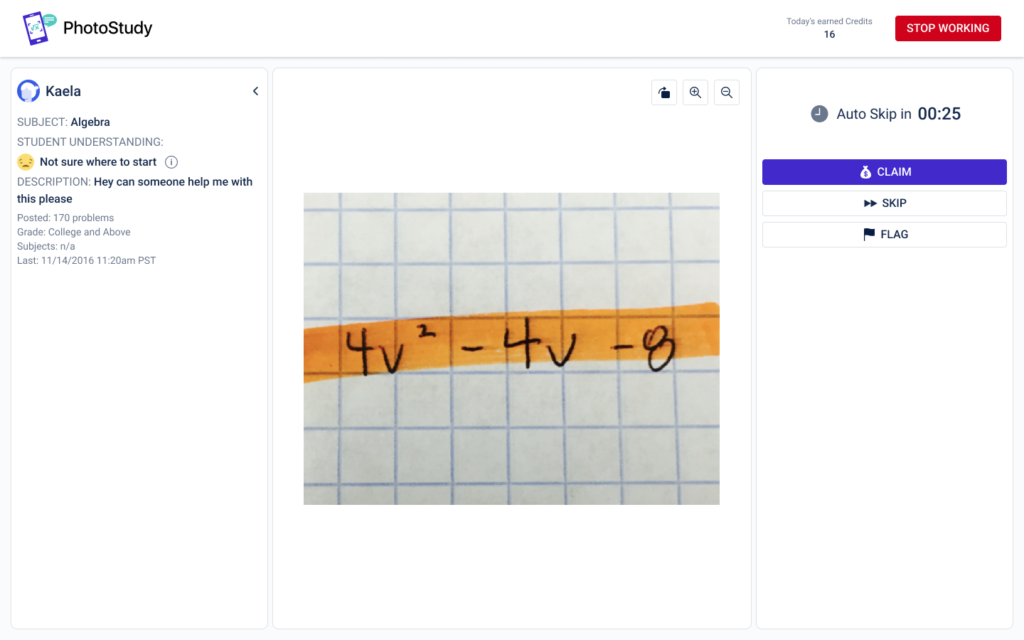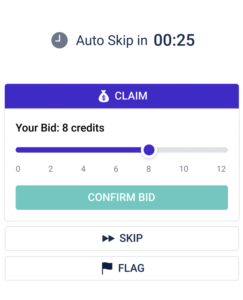WHAT IS THE BIDDING SYSTEM?
In the Expert Portal, all experts are paid using In-App Credits. When a problem is routed to our available experts, they are able to bid a maximum of 8 credits for basic subjects and 12 credits for higher-level subjects. The value of each unit of credit equals $0.125. Therefore, the maximum that an expert can earn per problem will be $0.125 x 8 = $1 for basic subjects and $0.125 x 12 = $1.50 for higher-level subjects.
HOW TO BID ON A PROBLEM
Below is an example of the bidding process, included are screenshots of what you should expect to see!
WORK SCREEN:
This is the initial work screen.
VIEWING A QUESTION:
This is what you will see when a photo problem is routed to you. You have three choices: claim, skip, or flag. Once the image loads, you can review the problem and then make your choice within 30 seconds or 45 seconds depending on the difficulty of the question. If no choice is made within the allotted time, the problem will be auto-skipped.
BIDDING ON A QUESTION:
When choosing to claim and bid on a problem, you will have to:
- Select the bid amount for the problem (the maximum number of credits is either 8 or 12 depending on the subject)
- Confirm the bid after you make your choices
AFTER BIDDING:
The system will then wait until all calculations are made based on the bid amount and expert performance. The question is then routed to the most suitable expert for answering!
SELECTING YOUR BIDDING STRATEGY
This bidding system allows you to choose your own bid amount depending on each individual problem – so you’re in control of what you earn!
However, when you and other experts bid on the same problem, in order to decide which expert will win the bid, our system will consider not only the expert bid amount but also the expert performance (mainly driven by your audit scores & student ratings) to grant the question. The expert with higher performance and lower bid will stand the highest chance of winning the question. Here’re some suggestions on how you should set up your bidding strategy based on your performance:
For established experts:
- With a top performance (Audit score among the top 10%): You have the flexibility to bid as many credits as you want given your top performer profile. A great strategy is to bid based on the difficulty level of each question.
- With good performance (Audit score among the top 25%): You have some competitive advantage while bidding against other experts. You can follow the question difficulty level strategy, but you should constantly evaluate your chance of winning bids. A good way to increase your winning chance is to try lowering your bid amount from time to time.
- For moderate performance (Audit score among the top 50%): You are in a competitive situation and bidding low is a good strategy to follow to increase your winning chance and earn the opportunity to improve your performance. Once your performance becomes stronger, it’s a good chance to switch your bidding strategy.
- For under-moderate performance (Audit score failed out of the top 50%): Your top 1 priority should be improving your performance. With this profile, your chance of winning bids with a high bid is rare. Bidding as low as you can for several sessions to earn good user ratings & audit scores would be the right strategy to follow.
TRACKING YOUR EARNINGS
The bid amount will be converted to actual earnings using this formula:
Total earnings = (Total bid amount) / 8
You can track your earnings by visiting this page: [pending link update]
For new experts:
- Your first sessions are super important! We highly recommend you only bid on problems you are confident in solving to ensure you deliver an exceptional session experience and build the foundation for a solid expert profile.
- To increase your chance of winning bids, we recommend you start by bidding lower amounts. It increases your chance of winning bids, giving you more real sessions to experience and help you receive feedback from the auditing team sooner.


